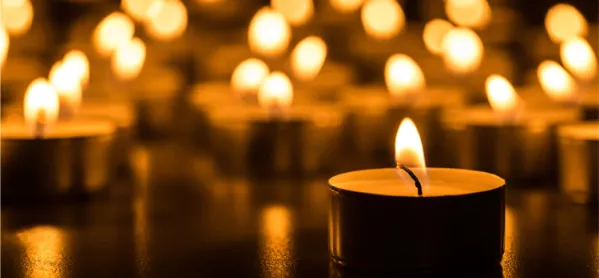- Home
- Holocaust Memorial Day: The school trip to Auschwitz
Holocaust Memorial Day: The school trip to Auschwitz

The following article first appeared in Tes in November 2007.
Behind the watchtower, the sky is grey; rain slashes at right angles to the barbed wire. The day is unremittingly bleak.
Two teenage girls stumble in the mud and puddles. "The least they could have done is lay a proper road," one says.
"I know," her friend responds, all teen outrage. There is a self-conscious pause before she adds, "Did they really walk down here in bare feet?"
Almost 200 sixth-formers from London schools, along with their teachers, are on a one-day visit to Auschwitz, the Nazi death camp in rural Poland.
From this year, the trip, organised by the Holocaust Educational Trust, will be on offer to two pupils and one teacher from every secondary school in the country. The government is funding the scheme, and Jim Knight [now Lord Knight, who was schools minister in 2007 and is now chief education and external officer at Tes' parent company, Tes Global] has chosen to spend a grey November day touring the camps with one of the first cohorts.
In the cold rain, the prison barracks look incongruously welcoming. Louisa Dunnigan, 17, from Latymer grammar school in North London, edges closer. "They look just like farm buildings," she says. "Warm and friendly."
Then they go inside. First there is the hair: piles and piles of it, cut from gas chamber victims. It is matted and discoloured into anonymous uniformity. Pupils look uncomfortable. One or two reach for their mobiles to take pictures.
Remembering the Holocaust
In the next room, a similar case houses piles of shoes, stretching towards the ceiling in ghostly monochrome. But there is the occasional flash of colour – a red sandal, a navy plimsoll, a pink bootie – and it is these indicators of individuality that one clings to. Silence descends, followed swiftly by horror.
"It makes me physically sick," says Louisa. "These were human beings, but they've been totally dehumanised. I've got so much stuff in my room at home, but when all that's stripped away, what are you?"
A short coach ride away is Birkenau, site of the notorious gas chambers. The guide leads pupils to basic wooden shacks where emaciated prisoners crammed into bunks.
It is cold; Jim Knight clasps his arms around himself. "Being physically uncomfortable, it enhances your understanding of what it must have been like for people dressed only in striped pyjamas," he says.
Nearby, Naomi Purvis, from Southgate secondary in Hertfordshire, nods: "I'm freezing. You start to lose concentration, but I'm wearing four layers and I ate four hours ago. It's opened our eyes. A textbook can't give you that."
Not everyone responds instantly. A girl poses for a photo next to the barbed wire. Laura Mauge, of Harris Academy in Croydon, scowls. "I don't approve of that," she says. "Though I do feel a bit emotionally detached. I thought I'd feel drained, but I don't. So I feel quite mean."
'We all have sorrows, but not tragedy'
Her history teacher, Anne Brunker, is similarly struggling to square past with present. "Our generation hasn't seen war," she says. "We all have our sorrows, but we don't have tragedy. But our pupils have grown up today. We'll remember it next time we read about the Holocaust. And we can stop these things happening again."
That, according to Karen Pollock, chief executive of the trust, is the point of the trip. Each pair of pupils will return to school and deliver a presentation on their experiences.
"This visit touches people," she says. "They come back with a sense of duty - recognising it's their role to act when they see injustice, be it bullying in the playground or genocide in Darfur. We want them to go away thinking, 'We shouldn't stand by.'"
Jim Knight, too, hopes that pupils will apply the lessons of the Holocaust to the world around them. "It's strange," he says. "We're in a place where human values were turned on their head, but it's reflected back at young people with such decent, empathetic values."
As the sun sets, the pupils troop out of Birkenau, down the railtracks that carried more than a million prisoners to their deaths. They carry candles, guttering in the darkness.
Adi Bloom is comment editor at Tes
Keep reading for just £1 per month
You've reached your limit of free articles this month. Subscribe for £1 per month for three months and get:
- Unlimited access to all Tes magazine content
- Exclusive subscriber-only stories
- Award-winning email newsletters



